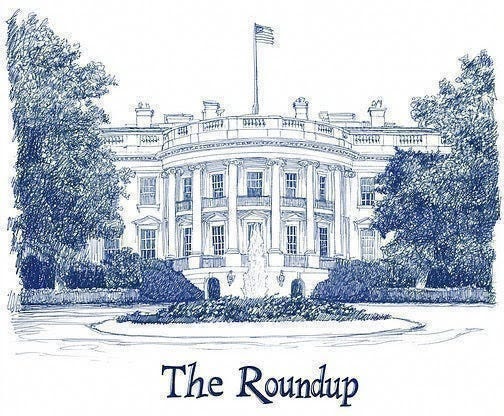Please click here to opt in to receive the Executive Functions Roundup via email and to subscribe to Executive Functions.
A panel of the Seventh Circuit on Wednesday stayed a preliminary injunction issued by Judge Sarah L. Ellis (N.D. Ill.) that forbade federal immigration agents from using specific crowd-control tactics and imposed requirements on their activities, calling the injunction “overbroad.” The court also ordered expedited briefing. (Order.) (NYT.)
The Chief Judge of the Ninth Circuit on Wednesday granted a partial administrative stay of a district court’s Nov. 7 permanent injunction, temporarily permitting the federalization of the Oregon National Guard while the court considers the government’s stay request and awaits the Supreme Court’s ruling in Trump v. Illinois. (Order.) For background on the permanent injunction, see a previous Roundup.
Judge James Boasberg (D.D.C.) said Wednesday that he will resume contempt proceedings over alleged violations of his temporary restraining order in the Alien Enemies Act deportation case, pointing to last week’s D.C. Circuit order as authorizing him to proceed. (Politico.) For background, see a previous Roundup.
Interim U.S. Attorney Lindsey Halligan appeared to acknowledge in court on Wednesday that the full grand jury did not review the final indictment charging James Comey, prompting one of Comey’s lawyers to assert that “there is no indictment.” (WSJ.) (NYT.)
President Trump announced on Wednesday that he signed the bill directing the Justice Department to release its Epstein files within 30 days. (Truth Social.) The legislation contains exceptions that could allow many of the documents to remain undisclosed. (Epstein Files Transparency Act.) (NYT.)
The White House is weighing an executive order that would direct the Justice Department to challenge state AI regulations and potentially withhold certain federal funds from states deemed overly restrictive. (WSJ.)
President Trump, speaking at a U.S.-Saudi Arabia investment forum on Wednesday, stated that he would “love to fire” Federal Reserve Chair Jerome Powell and publicly called on Treasury Secretary Scott Bessent to “work on him” to push rates lower. (WaPo.)
The White House nominated Stuart Levenbach as permanent director of the Consumer Financial Protection Bureau (CFPB), with a CFPB spokesperson stating that the nomination is a “technical” maneuver intended to allow acting director Russell Vought to continue leading the agency as the administration works to dismantle it. (Politico.)
Adrian Vermeule argued that true republican liberty requires a unitary executive, warning that a plethora of independent agencies can devolve into a form of “plural tyranny.” (The New Digest.)
Luke Schumacher contended that the mere absence of a governor’s consent is not a legal ground to block National Guard deployments to their states. (Lawfare.)
Pending Interim Order Applications Involving the U.S. Government in the Supreme Court
Blanche v. Perlmutter: The government filed an emergency application on October 27 requesting the Supreme Court to stay a district court interlocutory injunction that temporarily reinstated Shira Perlmutter to her role as Register of Copyrights while litigation over her removal continues. Chief Justice Roberts formally set a deadline of November 10 for a response to the application. Perlmutter submitted a response on November 10. Blanche submitted a reply on November 12.
Trump v. Illinois: The government filed an emergency application on October 17 requesting the Supreme Court stay a district court order barring the deployment of the National Guard to Illinois. Justice Barrett formally set a deadline of October 20 for a response to the application. Illinois and the City of Chicago submitted a response on October 20. President Trump filed a reply on October 21. On October 29, Justice Barrett requested supplemental briefs to be filed by November 10. President Trump, as well as Illinois and the City of Chicago, both filed supplemental letter briefs on November 10 and supplemental letter replies on November 17.
Trump v. Cook: The government filed an emergency application on September 18 requesting the Supreme Court to stay a preliminary injunction issued by a district court that blocked President Trump from removing Federal Reserve Governor Lisa Cook. Cook filed an opposition to the request on the same day. The Chief Justice formally set a deadline of September 25 for a response to the application. Cook filed a response on September 25. On October 1, the Court deferred action on the stay application pending oral argument in January 2026 and established a supplemental briefing schedule. Additional amicus briefs were filed on October 29. The Court set argument for January 21, 2026, requested the record on November 18, and both sides filed supplemental briefs on November 19.




